By Caribbean News Global ![]()
TORONTO, Canada – Taiwan has proved resilient in US-Taiwan relations and policy, ahead of the US Congress passing the Taiwan Relations Act (TRA), signed into law on April 10, 1979, by President Jimmy Carter, while steadfastly upholding the values of democracy and freedom, a sovereign and independent country.
More prominent today is Taiwan’s strategic global influence in trade, economy, technology, semiconductors, culture; and with other like-minded countries are steadfast in safeguarding peace and stability across the Taiwan Strait, defending common values of democracy and freedom, upholding the rules-based international order, and jointly advancing peace, security, and prosperity in the Indo-Pacific region.
Experimenting with economic reform, an open society, and a democratic system that has rewarded recurring dividends, Taiwan’s leadership and global influence continues with President-elect Lai Ching-te (賴清德) commitment to a democratic and peaceful Taiwan by maintaining the cross-strait status quo and safeguarding regional peace; an innovative and prosperous Taiwan through innovation-driven, inclusive and green economic growth; and a just and sustainable Taiwan through an equitable society and environmental sustainability, as reported in – A New Phase.
Notwithstanding a more complex reality and trends in world politics, economics, trade and security, Taiwan has proven leverage and understands the object of other nations’ card playing and chess manoeuvres.
The Taiwan Relations Act (TRA), built a strong foundation for US-Taiwan policies, underscores the importance of Taiwan in enhancing global trade and investment innovation, semiconductor manufacturing; and according to Global Finance, ranks 14th among the top 100 richest countries in the world.
US-Taiwan relations continue to update policies and best practices to reflect objective reality, and despite modern-day challenges, Taiwan is not deterred and continues to advance with exceptional leadership and development performance.

Commenting on the Taiwan Relations Act (TRA), Taipei Economic and Cultural Office in Miami (TECO), Director-General Charles Chi-Yu Chou, emphasised how “a national domestic law passed by US Congress in 1979, has built up a strong foundation for US policies towards Taiwan, underscoring the importance of Taiwan and enhancing exchanges in trade, economy, education, technology, and culture.”
Director Chou, in a previous communique, accentuated the benefits of Taiwan to the Indo-Pacific Economic Framework (IPEF), outlined two fundamental facts and illustrated one IPEF pledge that points to Taiwan’s “flexible and inclusive” economic resilience.
Taiwan President Tsai Ing-wen delivered her 2024 New Year’s address in the Reception Hall of the Presidential Office, noting significant advancements in democracy, economics and trade.
“We must show staunch determination, protect our free and democratic way of life, and reinforce the global belief that Taiwan is not an expendable member, but rather one that plays a key role in, and is essential to, global peace and democracy.
“Over the past eight years, we have done our utmost to strengthen the nation and lighten economic pressures. By implementing the Forward-looking Infrastructure Development Program, 5+2 innovative industries plan, and our Six Core Strategic Industries policy, we have improved the investment environment and strengthened the nation’s economic structure, while also reducing the gap between urban and rural areas and enhancing overall quality of life.
“Taiwan, with a population of 23.5 million, is already the world’s 21st-largest economy, and our national competitiveness has risen to sixth worldwide in certain rankings.”
The global importance of Taiwan’s supply chain, producing most of the world’s advanced semiconductors, while promoting foreign investment and maintaining its research and development edge, adds to the six core strategic industries, and commands exceptional status.
Taiwan is a high-tech industry leader with an important position in the global economy, conveyed as ‘a top player in the world’s information and communication technology industry as well as a major supplier of goods across the industrial spectrum.’
Taiwan’s dominance in semiconductor manufacturing and the global supply chain represents around 65 percent of the global semiconductor supply and nearly 90 percent of the most sophisticated microchips. Taiwan Semiconductor Manufacturing Company (TSMC), is responsible for 55 percent of the world’s supply.
Taiwan’s signature industry, Taiwan Semiconductor Manufacturing Co, (TSMC), advancements in manufacturing and services, achievements in tourism, trade and investments, global export rankings and the signing of international agreements / MoUs in global investment and infrastructure development are vigorous.
Responding to global challenges and universal values, Taiwan commands a global position and substantial US strategic partnership, on account of TRA 45 – relative to the security, social or economic system of the people of Taiwan.
Guided by the Taiwan Relations Act, the three US-China Joint Communiques, and the Six Assurances, Taiwan continues to play a leading role in the global marketplace.
Understanding the TRA’s legal structure and policy foundation, rest the certainties of flexibility, boldness and pillars of an active role for Taiwan-US global interests now and in the future.
Reporting on MOFA’s International press assignment 2023, the articles and experiences below are consistent with Taiwan’s highly robust commercial, exchanges in trade, economy, education, technology, culture and US-Taiwan policy that reaffirms Taiwan’s participation and membership in international organizations, (WHA#77, WHO, WTO, UN, ICAO).
Related Links:





